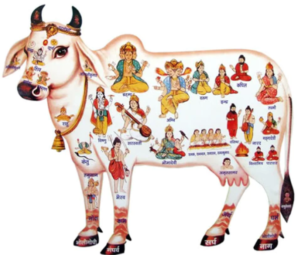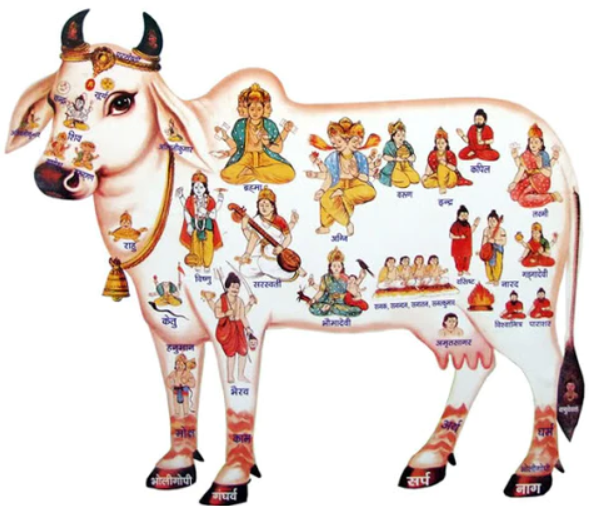Kamdhenu : The Most Sacred Cow In Hinduism
The Importance of Kamdhenu in Hinduism

Introduction
Kamadhenu, also known as Surabhi, is worshiped in Hinduism and represents plenty and fulfillment of wants. This heavenly cow emerges from the churning cosmic ocean, symbolising divine and earthy union. Kamadhenu, associated with Lord Krishna, grants wishes and symbolizes spiritual nutrition. Her milk is thought to include cleansing powers. In Hindu culture, Kamadhenu is renowned for her selflessness and nurturing role, which reflect unconditional love and motherhood. She represents not only monetary richness but also spiritual abundance, emphasizing dedication and sacrifice in achieving fulfillment.
The Legend of Kamdhenu
According to Hindu scriptures and tales, Kamadhenu arose while the gods and demons churned the milk ocean. This celestial bovine is blessed with magical powers and is frequently portrayed as a wish-granting cow. Kamadhenu is thought to have the ability to meet all of mankind’s needs, representing abundance and prosperity. She embodies the concept of divine feeding and is admired for her ability to fulfill desires. Kamadhenu has a prominent role in Hindu mythology, signifying the universe’s loving and nurturing element, capable of bestowing favors and fulfilling devotees’ wishes.
Kamdhenu and Sage Jamadagni
One of the most well-known stories about Kamadhenu is his relationship with Sage Jamadagni. According to the Mahabharata, Kamadhenu lived with the sage until the thousand-armed Haihaya monarch, Kartavirya Arjuna, demolished Jamadagni’s hermitage and took Kamadhenu’s calf. This act of hostility triggered a chain of events that concluded in the sage’s son, Parashurama, pursuing vengeance by annihilating Kartavirya Arjuna and his tribe. The story emphasizes the sage’s holy link with Kamadhenu, as well as the consequences of upsetting divine equilibrium and dharma (justice).
Kamdhenu in Hindu Mythology
Kamadhenu is honored in Hindu scriptures as the mother of all cows, representing fertility, food, and divine blessings. It holds great significance in Hindu rites, where offerings are offered during festivals and worship. Kamadhenu signifies humanity’s sacred relationship with the divine, representing abundance and the fulfillment of desires through devotion and reverence.
The Symbolism of Kamdhenu
Kamadhenu has multiple meaning in Hinduism, representing worldly richness, spiritual wealth, and success. Kamadhenu, as a supernatural entity capable of fulfilling desires, represents the concept of divine favor and blessings bestowed on devotees. This sacred cow represents the fulfillment of desires as well as the universe’s benevolence, motivating followers’ loyalty and adoration.
Spiritual Significance
Beyond its material connotations, Kamadhenu represents spiritual nutrition and the realization of spiritual desires in Hinduism. Kamadhenu is revered as a source of heavenly wisdom and enlightenment, guiding followers on their spiritual journey to freedom (moksha). This heavenly cow represents the pursuit of greater consciousness and the ultimate goal of overcoming earthly wants in order to achieve spiritual liberation.
Frequently Asked Questions
Q-1 What is the significance of Kamdhenu in Hinduism?
Ans. Kamdhenu holds immense significance in Hinduism as a divine cow symbolizing abundance, prosperity, and fulfillment of desires. It is revered as the mother of all cows and is associated with blessings and divine grace.
Q-2How is Kamdhenu depicted in Hindu mythology?
Ans. Kamdhenu is often depicted as a celestial cow with miraculous abilities, capable of fulfilling all the needs of mankind. It is portrayed as a wish-fulfilling cow, embodying the concept of divine blessings and abundance.
Q-3 What role does Kamdhenu play in Hindu rituals and ceremonies?
Ans. In Hindu rituals and ceremonies, Kamdhenu is revered as a symbol of fertility, nourishment, and divine blessings. Offerings are made to Kamdhenu during worship, seeking its blessings for prosperity and fulfillment of desires.
Read Next Article -:
Importance of Cows in Hindu Culture
5 Important Reasons Why Buddha Left His Home and Became a Monk

